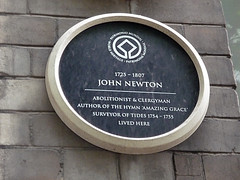Rev John Newton


Rev John Newton
(1725-1807)
Commemorated on 3 plaques
1725-1807 John Newton Abolitionist & clergyman Author of the hymn 'Amazing Grace' Surveyor of Tides 1754-1755 lived here
Orleans House, Edmund St, Liverpool L3 9NG, Liverpool, United Kingdom where they lived
The Rev. John Newton 1725-1807 slave-trade abolitionist (once a slave-trader himself), lived at Marchfoot House in Aveley parish as a youth and began his sea career here at Long Reach. His hymn still touches hearts worldwide: 'Amazing Grace... that saved a wretch like me'.
Children's Centre at the Garrison Estate, Purfleet, United Kingdom where they began a sea career and lived near
Olney Parish Church. Completed in 1325AD, this church is associated with William Cowper, the poet, and John Newton, Curate-in-charge and one-time slave trader; these two wrote "The Olney Hymns". Other outstanding characters include Henry Gaitlett, "Father of English Church Music", Moses Browne, of many parts (and many children) and Thomas Scott, the Bible commentator. The church of the Olney Pancake Race.
Olney Parish Church, Olney, United Kingdom where they worked (1763-1778)



